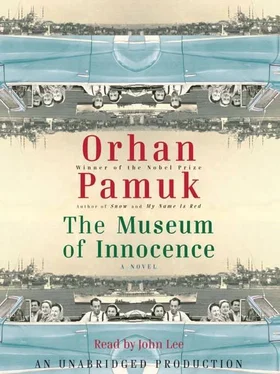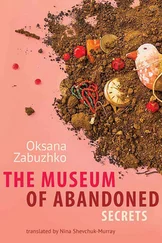On some days it was the dust and the chill in the room; on others it was our pallid, soiled, spectral sheets, our bodies, and the many sounds that filtered in from the life outside, from the traffic, from the endless noise of construction work and from the cries of the street vendors that led us to feel our lovemaking belonged not to the realm of dreams but to the real world. Sometimes we could hear a ship’s whistle from as far away as Dolmabahçe or Beşiktaş, and together we would try to guess what sort of ship it was, as children might do. As we continued to meet, making love with ever-escalating abandon, I came to locate the source of my happiness not only in that real world outside, but also in the tiny flaws on Füsun’s body, the boils, pimples, hairs, and her dark and lovely freckles.
Apart from our measureless lovemaking with childlike abandon, what was it that bound me to her? Or else why was I able to make love to her with such passion? Did the pleasure of satisfying our ever-renewing desire give birth to love, or was this sentiment born of, and nurtured by, other things as well? During those carefree days when Füsun and I met every day in secret, I never asked myself such questions, behaving only like a child greedily gulping one sweet after another.
14 Istanbul ’s Streets, Bridges, Hills, and Squares
ONCE, WHEN we were talking aimlessly, Füsun happened to mention a teacher she’d liked at lycée, saying, “He wasn’t like other men!” and when I asked her what she meant by that, she did not answer. Two days later I asked her once again what she’d meant by his not being “like other men.”
“I know you are asking this question in all seriousness,” said Füsun. “And I want to give you a serious answer. Shall I try to do that?”
“Of course… Why are you getting up?”
“Because I don’t want to be naked when I say what I have to say to you.”
“Shall I get dressed, too?” I said, and when she didn’t answer I too got dressed.
The cigarette packets exhibited alongside this Kütahya ashtray, retrieved from a cupboard elsewhere in the flat and brought to the bedroom, are-like the teacup (Füsun’s), the glass, and the seashell that Füsun kept fingering so nervously as she told her stories-assembled here to evoke the room’s heavy, draining, crushing atmosphere at that moment. Füsun’s girlish hair clip should remind us that the stories she told had happened to a child.
Füsun’s first story was about the owner of a little shop on Kuyulu Bostan Street that sold tobacco, toys, and stationery. This Uncle Sleaze was a friend of her father’s, and from time to time he and Uncle Sleaze would play backgammon together. When Füsun was between the ages of eight and twelve, and most particularly during the summers, her father often sent her to this man’s shop for soft drinks, cigarettes, or beer; every time she went, Uncle Sleaze would say, “I don’t have the correct change. Why don’t you stay for a while. Let me give you a soft drink,” and having used such pretexts to keep her in the shop, when no one was around he’d find some other excuse (“Oh, look, my poor child, you’re perspiring”) to feel her up.
When she was somewhere between ten and twelve, there was Shithead-with-a-Mustache, the neighbor who visited in the evenings once or twice a week with his fat wife. Her father liked this man very much, and while the two of them were listening to the radio and chatting, drinking tea and eating biscuits, this man would put his arm on her waist, or her shoulder, or the side of her buttocks, or her thigh and leave it, as if he had forgotten it was there, and all this in a way that no one else could see, so that even Füsun had a hard time understanding what exactly was going on. And sometimes this man’s hand would “accidentally” plop down on her lap, as a wily fruit might arrange to fall into a basket, and there it would quiver, moist and hot, fingering its way, with Füsun staying as still as if there were a crab crawling between her buttocks and her legs, this man all the while drinking tea with his other hand and engaging in the conversation in the room.
When she was ten, she would ask her father if she could sit on his lap while he was playing cards, and when he said no (“Stop, my girl, I’m busy, can’t you see?”), one of his card-playing friends (Mr. Ugly) invited her onto his lap, saying, “Come over here and bring me luck,” and he went on to caress her in a way that she would later understand to be far from innocent.
Istanbul ’s streets, bridges, hills, cinemas, buses, crowded squares, and isolated corners were filled with these shadowy Uncles Sleaze, Shit-head, and Ugly, who, though they appeared like dark specters in her dreams, she could not bring herself to hate as individuals (“Perhaps it was because none of them ever really shook me to the core”). What Füsun found hard to reckon was that even though one of every two family visitors quickly turned into an Uncle Sleaze or a Mr. Shithead, her father never noticed them squeezing or touching her in the corridors or the kitchen. When she was thirteen, she was convinced that being a good girl obliged her not to complain about this pack of shifty, sleazy, loathsome men with their restless paws. During those same years, when a lycée “boy” who was in love with her (about which Füsun had no complaints) wrote “I love you” on the street, just in front of the house, her father pulled her to the window by her ear to point at the writing and gave her a smack.
Because so many Shameless Uncles had a penchant for exposing themselves in parks, empty lots, and backstreets, she, like all presentable Istanbul girls, learned to avoid such places. Yet there were inevitably exceptions. One reason that these violations had not strained her optimism was that, even as they all repeated the secret refrain of the same dark music, the malefactors were at the same time eager to reveal their vulnerabilities. There was an army of followers-men who had seen her in the street, caught sight of her at the school gate, in front of the cinema, or on the bus; some would follow her for months on end, and she would pretend she hadn’t noticed them, but she never took pity on any of them (I was the one who’d asked if she had). Some of her followers were not so besotted, or patient, or polite: After a certain interval, they would start pestering her (“You’re very beautiful. Can we walk together? There’s something I’d like to ask you. Excuse me, are you deaf?”), and before long they’d get angry, saying rude things to her and cursing her. Some would walk about in pairs; some would bring along friends to show them the girl they had been following in recent days and get a second opinion; some would laugh lewdly among themselves as they followed her; some would try to give her letters or presents; some would even cry. Ever since one of her followers had pushed her into a corner and tried to force a kiss on her, she had stopped challenging them the way she occasionally used to do. By the age of fourteen, she knew all the tricks that men played and could read their intentions so men could no longer catch her unawares and touch her, and perhaps she no longer fell into their traps so easily, though the streets were never short of men finding imaginative new ways to touch her, pinch her, squeeze her, or brush her from behind. The men who stretched their arms out through car windows to fondle girls walking down the street, the men who pretended to trip on the stairs in order to press themselves against girls, the men who abruptly started to kiss her in the elevator, the men who took with their change an illicit stroke of her fingers-it had been some time since any of them could surprise her.
Every man in a secret relationship with a beautiful woman is obliged to jealously hear various stories about the various men who were infatuated with, or putting the moves on, his beloved, reports to be greeted with smiles, an abundance of pity, and ultimately contempt. At the Outstanding Achievement Course there was a sweet, gentle, handsome boy her age who was always inviting her to go to the cinema or sit in the tea garden on the corner, and whenever he saw Füsun he was so excited that for the first few minutes he was speechless. One day when she mentioned that she didn’t have a pencil he gave her a ballpoint pen, and he was ecstatic to see her using it to take notes in class.
Читать дальше












